On April 20th,21st 2018, Mike Peters of The Alarm will be travelling across the globe on a whirlwind 24-hour mission to celebrate the release of the brand new The Alarm – Where The Two Rivers Meet 8-track EP, which is an official release exclusive to World Record Store Day 2018. The 24-hour Transatlantic Tour takes in the UK, New York and LA and marks the start of a very exciting new era for The Alarm community with a tour and new album coming in June. Mark Millar caught up with Mike to discuss.

Why did you decide to travel across the globe on a whirlwind 24-hour mission taking in the UK to New York Los Angeles and California, all on the same day to celebrate the release of the brand new EP Where the Rivers Meet?
M.Peters: The idea came from a track on the EP called Transatlantic. I decided to zoom in on that when I thought about Record Store Day because last year we released a film in the USA called Man in the Camo Jacket. Which tells the story about my personal situation living with Leukemia for over Twenty years and I had started a charity called Love Hope Strength. Last year we put out a record for record store day, and I did an in-store at Fingerprints Records in LA. So when the idea came about to release the new record around Record Store Day, I thought it was a shame that I couldn’t go back and play to all those people who turned up in LA last year. I had been at Live Aid back in the eighties, and I was there in the stadium when Phil Collins flew over on Concorde.
I think then it seemed like such a futuristic idea that someone could get on a plane in London and play the second gig in the same twenty-four hours on another continent. That moment is seared in a lot of peoples memory banks from the generation who was part of Live Aid. So with the song title Transatlantic, I thought – let’s do something mad. with my own experiences with Record Store Day I realize its an incredibly full-on event for a lot of people and people are trying to do all sorts of things. I think there is a lot of healthy competition for bands to try and outdo each other so I thought “right I’m going to see if I can play in the UK, New York, and LA”. I had planned to play in even more places, but I couldn’t work that out with the timings. The idea has caught a lot of peoples imagination – certainly from our fans point of view. I thought if I could cram as much into one day then I could get to meet and see and interact with as many Alarm fans as possible and no one would feel left out of the day because everyone will have a chance to be part of it.
The EP is the first new Alarm music in a long time, and I want to share the excitement of the day with our fans all over the planet in a vivid way that fires their imagination and gets me excited and shows our commitment to the new music we are making. We are really proud of it, and we want people, to hear it.
Your fans are very important to the band I can imagine they will all turn up proudly wearing their Alarm t-shirts giving you support.
M.Peters: Yeah, we are definitely one of those band’s who has a strong allegiance with our fans who are into what we are and how long we have been performing and staying alive. We must have a lot of t-shirts out there scattered around the planet. I thought here’s a great opportunity for fans to come out in force and wear their shirts and go to the record stores and make our community known. I think we have created some fantastic t-shirts over the years and it will be great to see them all out and blasted all over social media. These days fans buy as many t-shirts as they buy records its a big part of our culture in music.
So I thought here’s a great chance alongside Record Store Day for fans to get their shirts out and celebrate with us the fact we have a new Alarm record out on that day. Some of them will get the bus into town – go to their favourite store – grab the record and read the sleevenotes on the way home and then have that excitement when they put the needle down, and the songs come blasting out of the speakers.
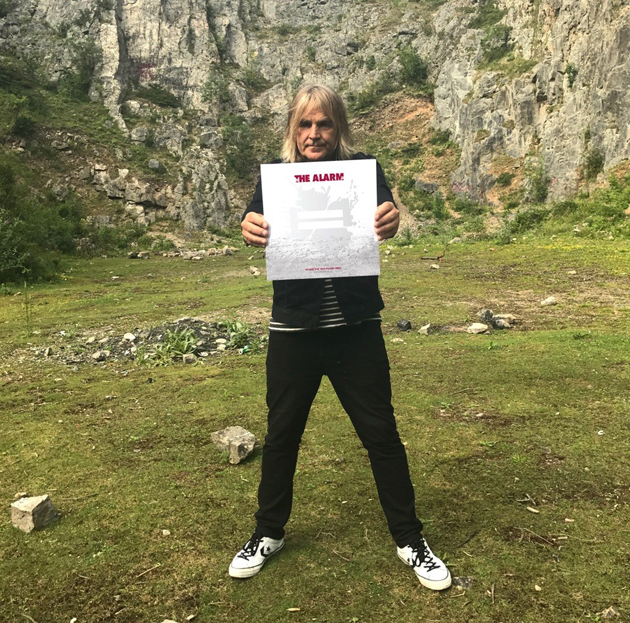
What does Record Store Day mean to you and do you think its important to keep record stores alive?
M.Peters: Very much so I have always been a collector of records, and naturally, my music career started off by walking into a music shop, and hearing records played over the counter and buying my first single. I got to know about some of my favourite bands from the relationship I had with the guy over the counter in Rick Greaves record shop in Rhyl. It was the place where I first bought my singles and albums. And then in the eighties, there was a shop called Kavern Records which was a brilliant record shop – the guy over the counter was called ‘Scratch’ – he was so cool and knew about every band who was coming out. He knew about all the independent labels from Postcard Records, Good Vibrations and the stuff that was coming out of Liverpool. He played everything that was out there in the shop.
I spent hours and hours in there talking to him and soaking the atmosphere up and hearing obscure records as they came in and getting turned on to up and coming bands. When we came to make our first record as The Alarm which was called Unsafe Building. We went to a studio in Manchester, and we took Scratch from the record shop as the producer – I thought if he likes the record and gives it the ‘okay’ and feels proud to play in his record shop then we are making the right kind of music. So he’s credited as the producer on our first single.
The Alarm’s career was born out of hanging around record shops and educating ourselves through other peoples music and the ideas that were being expressed through 7-inch singles and Lp’s. At the time that was all there was and it was all vinyl. As our career developed in the eighties and we started to have some success through appearing on Top of the Pops or American Bandstand and MTV, I think music became very corporate. The only bands that could be featured in record shops were the ones that had a record label behind them that could buy the rack. And all of a sudden the power that the guy behind the counter had was diminished because he was forced to only put records in the window that was the produce of the major record labels who were taking over the promotion in the stores. It became less personal, and I think Record Store Day has empowered those aficionados who actually love music. There’s that saying about the Velvet Underground – that they only sold a thousand albums but every single person who bought the album started a band, and I think its that commitment to those guys behind the counter. One thing I missed when record stores became big chains and all the indies started to disappear was you couldn’t walk in and say “hey have you heard this record?” I think Record Store Day has really given back a lot of the power and love of music to the people who understand it and know how to communicate it.
Can you remember the first record you bought that meant a lot to you?
M.Peters: Yeah, the first album I ever bought was Alladin Sane by David Bowie. I remember seeing Bowie on Top of the Pops. The first record I ever went to buy was Slade Alive. And when I got into the record shop, and I looked at the cover and read the tracklisting on the back it had Born to be Wild with Mars Bonfire after it in brackets, and I thought “I don’t want it I only want songs with Slade.” I didn’t realize that the credits featured the songwriters, not the artists and I thought it was another person appearing on the record. (laughs) So when I looked at the Bowie album, I thought “ill have that instead.” and never looked back.
When you were writing songs for singles did you consider b sides to be important?
M.Peters: The Punk era set me running with the Sex Pistols and The Clash and all the bands at that time as well as the Beatles. Their singles went on the albums, and often it was the b sides that stayed with me longer than the singles because the singles tend to get overplayed. For example, I loved Strange Town by the Jam, but over time the b side which was the Butterfly Collector has stayed with me a lot longer as a song. When we started The Alarm, we were immersed in that culture, and we wanted our fans to have amazing tracks on the b side, and we have never stopped aspiring to that. Even the EP that’s coming out on Record Store Day has got eight tracks on it, and only two of them are on our forthcoming album, and the other six are acoustic tracks and brand new songs recorded especially. There is a track called Year One which is the longest song we’ve got in the Alarm’s history. I had these massive lyrics, and we committed them to music – I think that will be a unique track for our fans that they will only get when they buy that EP. There is a broad well of information in that song for the fans to discover. I will be carrying an inner sleeve that has the lyrics for that particular song spread all over it, so for the fans will only get that by interacting with me on Record Store Day or by entering into the t-shirt ‘Wear and Share’ campaign.
The digital age benefits bands which are dedicated to keeping a line of communication open with their fans. You can do a lot more with your audience now than you ever could because now you can speak directly to your fans. In the eighties the only way could let people know about a tour was to go through a third party which was often NME, Sounds or Melody Maker and they often would put a comment in of their own that didn’t sit with your relationship with your fans. I think its a real benefit for artists like myself who want to have a connection with their audience.
I’ve been playing since 1981 as The Alarm, and I can’t help to have a relationship with the fans. When I’ve had to face Cancer in my life and couldn’t tour, we created a scenario where fans could get on the train, planes and their cars and come to me instead. We have got a very one on one relationship with our audience and its probably the most critical factor we’ve had as a band because when we get our audience together at the weekends at the ‘Gathering’ in North Wales – we talk and we have Q and A’s and we find out what sits with our audience musically and what doesn’t. Its what has kept us relevant in their lives and has been a real source of lifeblood for us.
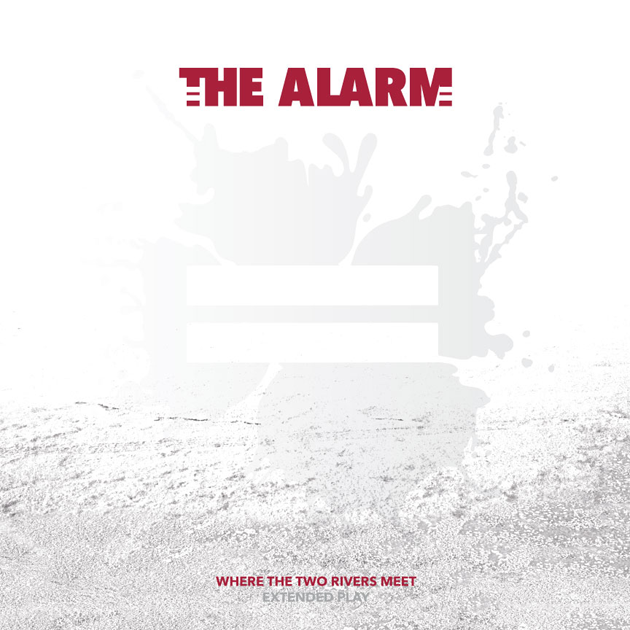
The EP features Billy Duffy (of The Cult). How did he get involved?
M.Peters: We both met around 1996 at a festival in the middle of England, and we were both playing in a football tournament, and we got on great. The Cult had split up, and the Alarm wasn’t happening at that time either, and we both liked walking in the mountains, so I invited him to come to Wales, and we both climbed mountains in Snowdonia. We learned a lot from talking to each other about how bands work. I was able to learn how a guitarist could get into conflict with a singer and by talking to Billy who wasn’t in my band but had similar experiences – I was able to learn a lot, and I think vice versa. Billy was able to get a greater understanding of what Ian Astbury brought to the Cult just by talking to me. I was able to be a bit more rational and not as one-sided, so I think we both gained a lot of insight by talking to each other. We started a band at that time which was short-lived called Coloursound. We wrote some amazing tracks, and the band became quite hot in the music industry, and we played a fantastic gig in London. Ian Astbury was at the gig and Eddie Mcdonald the bass player in the Alarm, and within minutes everyone was on the phone saying; “let’s get the Alarm back together, let’s get the Cult back together.” (laughs) And in a way, that band paved the way for our modern era of both bands that we have. Billy and I have always stayed great mates, and we have always wanted to work together.
We played in LA last year not long after Prince had died and Billy came out, and we played a version of The Cross from Sign O’ the Times and Billy blew the house away with his guitar playing. In the summer he came over when we were working on the record and came to the studio in Liverpool and was hanging out for a couple of days. I wouldn’t ask him to play – I would never do that but at the end of the session he said; “if you want to send me a track ill play on it.” and I said; “why didn’t you say that two days ago?” (laughs) so I set up a session, and he came back over to play, and I wrote a song for Billy to play on called Blood Red Viral Black. His playing on it is out of this world, and he blew the roof down of the studio.
James Stevenson who plays in the Alarm was in the Cult with Billy as well in the past, so we’ve got a good long affinity with the Cult, and the Alarm that’s probably reflected in that recording. Billy plays on another track on our album that’s coming out in June as well. I’m proud to have him on an Alarm record.
The new Alarm album is coming out in June did you go into the recording of the new album and EP with any preconceived ideas what kind of songs you wanted to write and how it should sound?
M.Peters: The album was born out of the fact that my wife Jules got diagnosed with breast cancer about eighteen months ago so we had to put everything on hold and an intense period opened up for all of us associated with the band and family. I found myself in some distressing situations in hospitals, and so I felt the need to get something out of my system, and I started writing a lot of lyrics. I didn’t have access to a musical instrument where I was so I started writing lots of words down about how I felt. I was putting feelings I had down so I could understand how they were impacting on me. When Jules had come through the ordeal, and I got back to the studio I layed down all these lyrics down all over the place. I had never worked in that way before I had always been a musician who wrote on the guitar or came up with a hook or a chord line and then Id work back from the chords to the verse to the bridge to the intro.
And this time I was working from the lyrics and coming at it all from another entirely different direction. I ended up creating about forty songs worth of demos that became the basis of the new album. We started sharing the demos live through the fans on thealarm.com and started to work out which of the songs would be part of the future of the Alarm and how we would take the band forward. We are very excited about whats coming.
The Alarm recently reissued ‘Eponymous 1981-1983’, ‘Declaration 1984-1985’ and ‘21’ [Redux]. It’s a very exciting time for fans of The Alarm with all the new releases.
M.Peters: We have been releasing music on our label since 1994. Our new album is our one hundredth catalogue number on our label. We have built our independence over the last decade slowly creating the environment that allows us to make records and make music on our own terms. We recently got our first ever proper distribution deal we ever had so it allowed us to make our music much more accessible. We were very much a boutique label throughout the nineties, and the zeros and all our music was only available through our website, so it was really only for Alarm aficionados only almost. Now we can put our music out there to widen the scope of what we do. So we were able to release excellent reissues of the first two eras of the band’s music, and it got us back in the Billboard charts in America, and now we are in record stores all over the world.
Until this year when we put a record out in would have to be in the post for a week getting to America, so at least now our fans can come out on a day like Record Store Day and buy the record all at the same time – its all part of the joy of discovering music.
What keeps the Alarm going after all these years?
M.Peters: Creatively we have had a destructive element to us that has kept us fresh and excited and interested. We have never settled into a band that goes through the motions. Lineups have changed, but our friendships remain. Dave, our original guitarist, is not in the group but he’s on tour with us all year opening the shows, and he jumps up on stage and plays with us sometimes. We have always been about breaking things up to start again and have a fresh start. I think as much as that can be infuriating for our fans also when you look back over it its been a massive benefit. Sometimes the band doesn’t have to be five people it can go down to one person and an acoustic guitar. That’s what I’ve always found interesting about The Alarm even from our very first gigs there was always a part where Dave would play a song on his own I would play a song on my own then we would play as a band or we would play with three acoustic guitars and a drum kit, no bass. We have always tried to have a very fluid outlook and strip things down or make things massive. We have done gigs where there have been ten musicians on the stage – we’ve had two choirs and an orchestra at one gig at the millennium centre in Cardiff. The band has not been driven by its line up or its membership it’s being driven by the songs and the lyrics and that where our connection lies with our audience.
We can be contentious with each other and our audience but when we get it right it is really uplifting and can be massively positive. We have got a charity that spun off from our music that has given a lot of meaning to what we do and what we have addressed regarding our humanity through the music. And We’ve stayed alive! The Alarm has broken up I’ve been taken to the edge of life faced with my own extinction and survived and lived – and that is what the bands all about.
How is your health now?
M.Peters: I’m robust 100% full capacity. I have a few challenges every now and again. I have been lucky that the benefits of the research in the developments in cancer treatments now mean that only in this last year I am on a drug now that has untethered me from being near hospitals. We couldn’t tour very much in the last twenty years or for long periods of time because I always had to be in a hospital every few weeks for treatment and to be enthused with chemotherapy. Now I take an oral chemo that I carry with me. So now I only go to the hospital once every three months. So that’s been a revolution in my life that has allowed me to live a much more normal existence as a husband and a father to two young kids and being in the band. It was only last summer that we could do a proper American tour, so we soaked it up and did fifty-five dates.
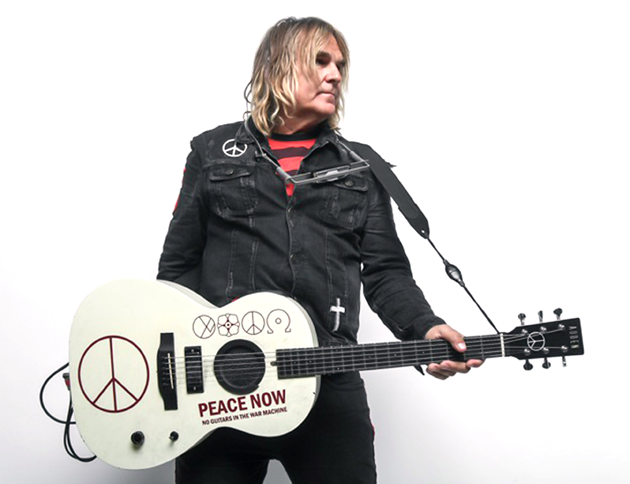
The Alarm playing 2 x Irish shows – 27 April at Dublin Academy and then 28 April at Belfast Limelight. Any special memories or experiences in Belfast?
M.Peters: We played the Mandela Hall in 1985 I remember that really well because we played on the day that Manchester United played Everton in the FA Cup final and Norman Whiteside scored the winner. That was the last we played in Belfast, and it was a fantastic place. One of the starts we have been given in life was through Jake Burns from Stiff Little Fingers he really liked the band before we were called The Alarm. Jake was the first person who took an interest in what we did and gave us some constructive criticism that was very important to the band and me.
When we reemerged as The Alarm a year later, Jake came to see us and then he invited us to play with Stiff Little Fingers on their last two gigs in Newcastle and Glasgow. And they basically handed their audience over to us for an interim period until they came back again. I will always be grateful for what Jake Burns did for The Alarm – For me; he epitomized Northern Ireland. He was a very intense person with massive integrity. Obviously, everyone in Northern Ireland from a certain age had lived through the troubles, and it affects people differently. Our guitarist, Dave Sharp in The Alarm, had been in the Merchant Navy as a kid, and he had a worldliness about him that I certainly didn’t have growing up in the relatively safe environment of North Wales. My education was through buying records and listening to the lyrics of Joe Strummer and Johnny Rotton whereas I think someone like yourself and Jake growing up in the troubles you get a whole education that we have no idea about and there’s a worldliness that comes with that. You could tell that Jake had lived through some tough times, but his humanity was incredible. I learned a lot from meeting Jake and appreciating life and how lucky I was to be who I was, and that was very important part of our breeding as The Alarm.
Last question. What have you been listening to recently that you could recommend?
M.Peters: I like a band from Britain called Cabbage. And my friend came around and played me a record yesterday from a group called Shame. That’s a band I’m looking forward to checking out live. I’ve got a feeling that they will be a really hot band.
The complete track listing of ‘Where The Two Rivers Meet’ Extended Play is as follows:
Electric Side
Two Rivers
Transatlantic
Blood Red Viral Black
The White Count
Acoustic Side
Thirteen Dead Reindeer [Acoustic]
Armageddon In The Morning [Acoustic]
Crowd Trouble [Acoustic]
Year One
The Alarm are playing 2 x Irish shows – 27 April at Dublin Academy and then 28 April at Belfast Limelight. For more info on The Alarm and tour dates check out the website – thealarm.com
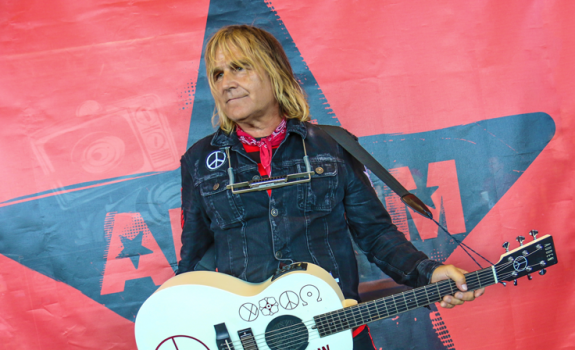

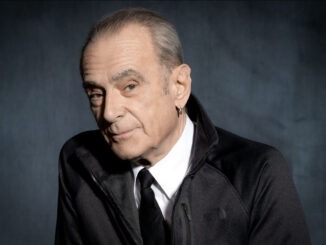
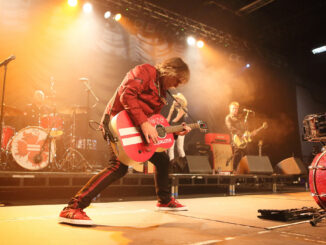
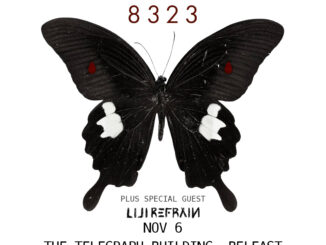
Be the first to comment